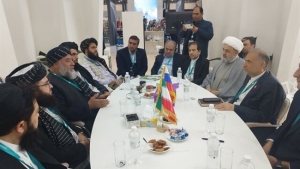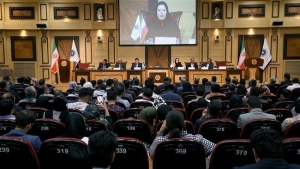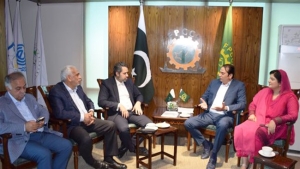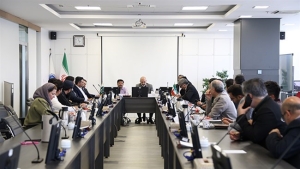ecocci
Iran’s five-month trade with Turkey hits $2.3 billion
A recent report by the Turkish Statistical Institute (TURKSTAT) suggests that Iran’s trade exchanges with Turkey reached $2.3 billion over the first five months of 2024.
The five-month trade between the two neighbors shows a 5 percent increase compared to last year’s corresponding period when the figure stood at $2.189 billion.
Turkey exported some $1.340 billion worth of goods to Iran from January to May 2024, marking a 16% year-on-year rise, according to the report.
Turkey’s exports to Iran stood at $1.151 billion during the same period of 2023.
Iran’s exports to the eastern neighbor was also reported at $960 million in the period under review, 7% down from $1.038 billion reported in January-May 2023.
Iran, Pakistan urged to exercise free trade
President of Iran Chamber of Commerce, Industries, Mines, and Agriculture (ICCIMA) Samad Hassanzadeh has stressed the need for Iran and Pakistan to exercise barter trade and free trade so as to materialize a target for increasing bilateral exchanges to $10 billion.
Hassanzadeh made the remarks in a meeting in Tehran on Sunday with Pakistani Ambassador to Iran Muhammad Mudassir Tipu.
Noting that Tehran and Islamabad can cooperate on different areas including pharmaceuticals, petrochemicals, energy, auto parts, techno-engineering services and electronics, he said that the ground is also prepared for cooperation on health tourism.
Hassanzadeh further stressed that an agreement for activating a joint trade council between the two neighboring countries is still in place.
The Iran Chamber of Commerce president said that the two countries have had many talks on the launch a barter trade system while no practical step has been taken.
He called on the Pakistani government to ease visa requirements for Iranian businesspeople.
The Pakistani ambassador, for his part, referred to his country’s agreement with the late Iranian president Ebrahim Raisi for increasing bilateral trade to $10 billion, adding that Islamabad continues to pursue this agreement.
The Pakistani government has decided for the joint border customs to work round the clock, the ambassador said, adding that it would be very effective if Iran also decides to do so.
He noted that the trade balance is one of the main obstacles on the way of trade between the two neighbors, as he said Iran’s exports to Pakistan stand at $1.6 billion while Pakistan’s exports to Iran are so insignificant.
He believed that the exercise of free trade rests upon win-win connections.
The ambassador added that if the Iran Chamber of Commerce recommends businesspersons to the embassy, there would be no problem for issuance of visa.
ECO Calendar 2024
Calendar of Events 2024
Afghanistan eyes $10 billion trade with Iran
Afghanistan’s acting minister of commerce Haji Nooruddin Azizi says his country is seeking to enhance bilateral trade with Iran to over $10 billion.
He made the remarks as he met with Iran’s Ambassador to Russia Kazem Jalali which was held on the sidelines of Kazan Forum 2024 on Friday.
The Afghan minister said that Iran’s southeastern port of Chabahar provides Afghanistan and Central Asian countries with the best access to the high seas, calling for further facilitating the transport thorough this path.
He also urged the need for Iranian border customs to work round the clock so as to give a boost to bilateral exchanges.
Afghanistan calls for more investment of Iranian private sector
Businesspeople from Afghanistan have stressed the need for Iranian private sector to make more investment in the country.
An Iran-Afghanistan Business Forum was held in the headquarters of Iran Chamber of Commerce, Industries, Mines, and Agriculture (ICCIMA) in Tehran on Monday as a major Afghan trade delegation is in the Iranian capital to attend Iran Expo 2024.
Addressing the business forum, ICCIMA Vice President Qadir Qiafeh welcomed the peace in Afghanistan after years of insecurity and said that the Iran Chamber of Commerce is ready to help the promotion of trade ties with the neighboring country.
Noting that the volume of trade between Iran and Afghanistan has reached $2 billion, he said that Afghanistan is now one of the top five destinations for Iranian products.
He urged the need for the chambers of commerce of the two countries to prepare plans for strategic measures so as to witness a growth in bilateral relations.
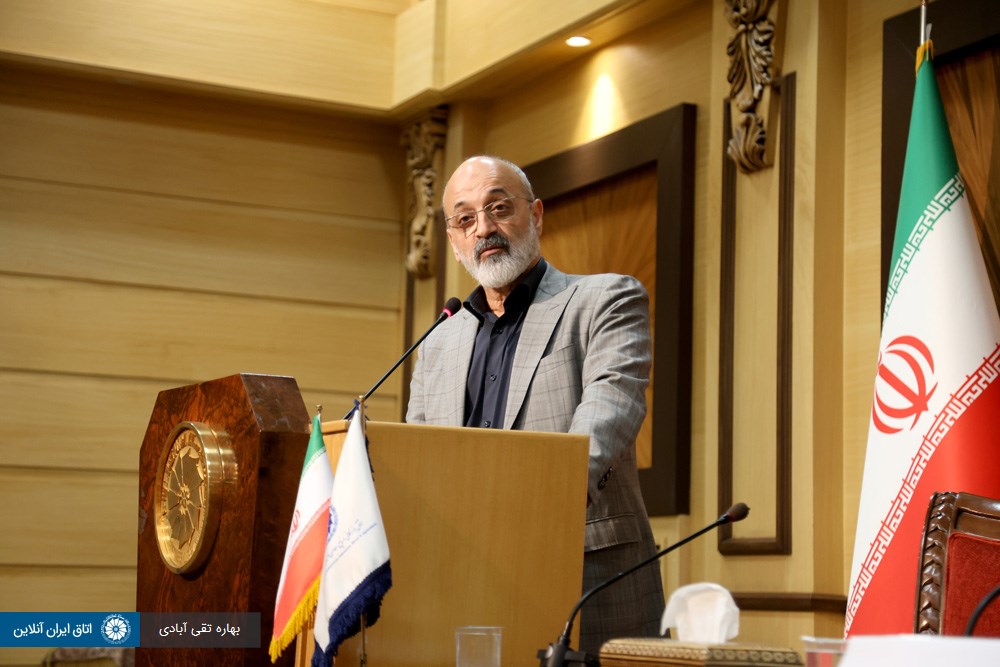
Speaking in the meantime, Deputy Head of Afghanistan Chamber of Commerce and Investment Mohammad Younus Mohmand said that Afghanistan has passed behind 45 years of war and is now witnessing security.
“By restoring trade relations with all world countries, we have increased Afghanistan's exports from $700 million to $2 billion,” he added.
He urged the need for the Iranian private sector to make investments in Afghanistan, while noting that the Chinese have a stronger presence in the country.
Mahmand stressed that his country needs Iranian experience and technology in different areas, including trade, transit, knowledge-based sector, and mines.
He added that Afghanistan railway network provides Iran with access to China and Central Asia.
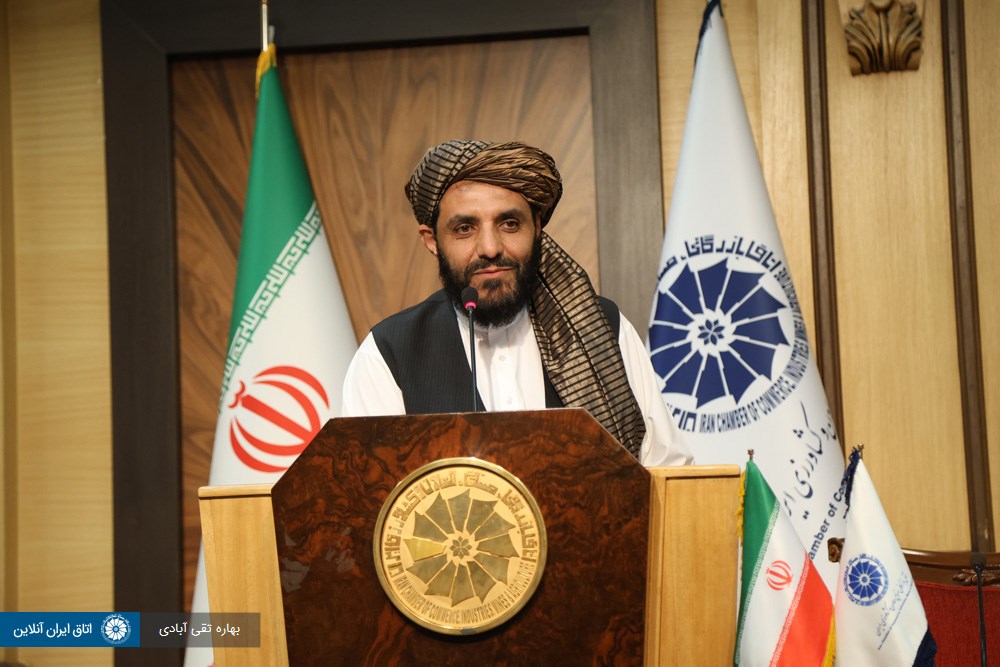
Over 1,000 Iranian companies operating in Uzbekistan
More than 1,000 Iranian companies are presently operating in Uzbekistan, it was noted in an Iran-Uzbekistan Business Forum in Tehran on Sunday.
The business forum was held as an 80-member Uzbek trade delegation is in the Iranian capital to attend Iran Expo 2024.
During the forum, both sides underlined the need for increasing the volume of trade between Iran and Uzbekistan from the current $500 million to $1 billion.
Addressing the forum, Niloofar Assadi, an official with the international affairs of Iran Chamber of Commerce, Industries, Mines, and Agriculture (ICCIMA), referred to different obstacles on the way of trade and joint investments between the two countries, urging the need for forming a council with presence of representatives from both Tehran and Tashkent.
She believed that the economies of Iran and Uzbekistan complement each other and can meet the needs of each other.
Uzbekistan’s Ambassador to Tehran Fariddin Nasriyev also addressed the forum, noting that the presence of a big Uzbek delegation in Iran Expo indicates the high willingness of the country’s business actors for more engagement in trade exchanges with Iran.
He said that the officials from both Tehran and Tashkent are focused on joint investments which requires the private sectors of the two countries to make efforts in this regard.
Noting that the Uzbekistan’s government supports any kind of investment in the country, the ambassador said that security of investment in his country is guaranteed.
He further added that the ground is prepared for exports of Iranian pharmaceuticals to Uzbekistan and even establishment of a medical production line in the county.
In the meantime, Mousa Aghaei, the chairman of Iran-Uzbekistan Joint Chamber of Commerce, said that Tehran and Tashkent have to do their best to facilitate tourism between the two countries.
Referring to obstacles hindering trade between Iran and Uzbekistan, he said that a great part of these problems have been caused by US sanctions on Tehran.
ایجاد منطقه آزاد مشترک ایران و پاکستان به توسعه روابط دو کشور منجر خواهد شد
سیدحامد عسگری، در دیدار با عاطف اکرام شیخ، رئیس فدراسیون اتاقهای بازرگانی و صنایع پاکستانر، که در حاشیه سفر هیات عالیرتبه ایرانی به این کشور انجام شد، افزود: سرمایهگذاریهای مشترک و گستردهتر دو کشور در سطح دولتی و خصوصی برای استفاده از ظرفیتهای یکدیگر ضروری است.
او با تاکید بر تلاش دولتهای ایران و پاکستان برای تسهیل روابط تجاری دو کشور، افزود: ایجاد منطقه آزاد مشترک با مشوقها و حمایتهای هر دو دولت، انگیزه مضاعفی برای همکاریهای بیشتر خواهد بود.
معاون بینالملل اتاق ایران، بر ضرورت تقویت زیرساختهای تجاری دو کشور تأکید کرد و گفت: بهبود در بخش حملونقل، گمرکات و رفع موانع تعرفهای و مشکلات نقلوانتقال پول از اولویتهای ارتباط با پاکستان است.
او تأکید کرد: با توجه به اهمیت کاهش تعرفههای گمرکی برای جهش تجارت دو کشور و گسترش تجارت از مسیرهای قانونی و همچنین بهرهمندی استانهای همجوار از فرصتهای موجود، نیاز است توافق تجارت آزاد میان دو کشور هر چه سریعتر نهایی و امضا شود.
عسگری اظهار کرد: فرصتهای تجاری و سرمایهگذاری زیادی در حوزههایی چون انرژی، تبادل فناوری، محصولات و خدمات دانشبنیان، فرآوردههای گازی و نفتی و شیمیایی، فولاد، کشاورزی و مواد غذایی و بسیاری حوزههای دیگر از جمله مصالح ساختمانی و کاشی و سرامیک، وجود دارد.
او در پایان با تقدیم دعوتنامه رئیس اتاق ایران به عاطف اکرام شیخ، از او خواست در رأس هیاتی از پاکستان، در نمایشگاه اکسپو ایران ۲۰۲۴ شرکت کند.
عاطف اکرام شیخ، رئیس فدراسیون اتاقهای بازرگانی و صنایع پاکستان نیز ایجاد منطقه ویژه اقتصادی مشترک بین پاکستان و ایران را گامی مثبت در جهت تقویت روابط اقتصادی دو کشور دانست و گفت: ایجاد منطقه اقتصادی دوجانبه در سطح دولت به دولت به نفع اقتصاد خواهد بود.
او افزود: پاکستان و ایران فرصتهای زیادی برای همکاری در بخشهای کشاورزی، تجارت، سرمایهگذاری و فناوری اطلاعات دارند و هر دو کشور نه تنها خواستار همکاریهای دوجانبه هستند، بلکه به هدف افزایش تجارت دوجانبه تا سقف پنج میلیارد دلار دست یافتهاند.
عاطف اکرام ادامه داد: روابط تجاری بین پاکستان و ایران از سالها پیش برقرار شده است اما حجم تجارت فعلی بسیار کمتر از ظرفیت آن است. نهایی کردن موافقتنامههای تجارت آزاد و ایجاد پیوندهای نهادی بین بخشهای خصوصی از مهمترین گامهای دو کشور است.
موضوع ایجاد مناطق آزاد تجاری در گذرگاههای مرزی مشترک، همکاری در بخش بهداشت دامی و همکاری در بخش استاندارد، از مهمترین اسناد همکاری اقتصادی و مورد مطالبه فعالان اقتصادی دو کشور بود که توسط همتایان پاکستانی و ایرانی بود به امضا رسید.
Iran, Pakistan urged to exercise barter trade
Economic activists from Iran and Pakistan believe that the two countries have to exercise free trade and barter trade mechanisms to further expand bilateral relations.
Iranian and Pakistani trade delegations met in a business meeting in Chamber of Commerce, Industries, Mines and Agriculture (ICCIMA) headquarters in Tehran on Saturday which took place on the sidelines of Iran Expo 2024 in the Iranian capital.
Speaking during the meeting, the ICCIMA Vice President Qadir Qiafeh said that a $2.1 billion trade between Iran and Pakistan is not proportionate with economic and historical relations between the two neighboring countries.
He referred to targeting $10 billion in bilateral trade, noting that the private sectors of the two countries have a major role in reaching this goal and have to make the necessary planning in this regard.
Ashfaq Ahmed, the vice president of the Federation of Pakistan Chambers of Commerce and Industry, who was also present at the meeting, said that many obstacles, including the lack of direct maritime routes, are hindering the exchanges between Iran and Pakistan.
He also noted that enhancement of banking relations will help facilitate trade exchanges.
Iran private sector highlights preferential trade with Turkmenistan
President of Iran Chamber of Commerce, Industries, Mines, and Agriculture (ICCIMA) Samad Hassanzadeh has stressed that enhancement of trade between Iran and Turkmenistan relies on establishment of a preferential trade system between the two countries.
Hassanzadeh made the remarks during a meeting in Tehran on Saturday with his Turkmen counterpart Mergen Gurdov.
Noting that Iran-Turkmenistan trade volume stands at $450 million, he said that bilateral exchanges between the two neighboring countries is far behind the potentials.
There is a big potential for cooperation in tourism and health tourism, the Iran Chamber of Commerce president said, adding that Iran can also meet the needs of Turkmenistan in the areas of knowledge-based technology, industry, mine and agriculture.
Referring to problems facing Iranian businesspeople in trade with Turkmenistan, he said that Iran has unilaterally facilitated visa requirements for Turkmen nationals and expects Turkmenistan to reciprocate Iran’s measure.
In the meantime, the Turkmen side referred to major potentials for trade between Iran and Turkmenistan, adding that the Chamber of Commerce and Industry of Turkmenistan is ready to pave the way for further expansion of bilateral trade.
Hailing the high level of Iran Expo 2024, which is currently underway in Tehran, he said that a similar exhibition is held annually in Turkmenistan and the country is willing to see Iranian businesspeople in this event.




